Underground Crypto Market Premiums in Banned Jurisdictions - Risks and Prices in 2025
Crypto Market Premium Estimator
Risk Factors
- Enforcement Intensity High
- Risk of Legal Penalties Very High
- Surveillance Tools Advanced
Market Dynamics
- Supply Restriction Moderate
- Liquidity Drag High
- Technology Access Limited
When a country tells its citizens they can’t own or trade digital assets, a hidden economy usually springs up. Those shadow traders pay more than the official exchange rate - the difference is called a crypto market premium. In 2025, the premium gap is biggest in places where enforcement is harsh and legitimate avenues are shut down completely.
Underground crypto market premiums are the price differences between officially quoted cryptocurrency rates and the rates offered on illicit or gray‑market platforms in jurisdictions that ban or heavily restrict crypto activity. Understanding how these premiums form, where they are most pronounced, and what drives their size helps investors, policymakers, and compliance teams anticipate hidden risks.
Why a Premium Exists: The Economic Mechanics
Three core forces push the underground price above the official market:
- Supply restriction. When legal exchanges are shut down, the only way to get crypto is through clandestine channels, shrinking the effective supply.
- Risk pricing. Sellers face criminal penalties, asset seizure, and personal danger. They charge a risk premium to compensate for the possibility of arrest or loss.
- Liquidity drag. Underground networks lack the deep order books of regulated exchanges, leading to wider bid‑ask spreads and higher transaction costs.
These forces interact with local enforcement intensity, technology access, and cultural attitudes, creating a highly variable premium landscape across different banned jurisdictions.
Spotlight on the World’s Strictest Jurisdictions
While precise numbers are scarce - underground operators rarely publish pricing data - we can infer premium levels from enforcement actions, reported arrests, and the sophistication of the black‑market infrastructure.
China’s All‑Out Ban
China enacted a sweeping ban on May 30, 2025, criminalising personal ownership of any cryptocurrency and reinforcing its state‑backed digital yuan. The ban covers mining, trading, and even private wallets. Enforcement agencies now monitor internet traffic, financial flows, and even social media for crypto‑related keywords.
Given the scale of the crackdown, any underground transaction carries a high probability of detection. Analysts estimate that risk premiums could reach 30‑50% above the spot price on reputable overseas exchanges, especially for large‑value trades that attract more scrutiny.
Afghanistan’s Religious Ban
The Taliban’s decree from 2022 declares crypto “haram” and bans every crypto‑related activity. Enforcement is carried out by the Da Afghanistan Bank, the nation’s central bank, and the Financial Transactions and Reports Analysis Center of Afghanistan (FinTRACA).
Because the regime’s financial surveillance is uneven, smaller peer‑to‑peer deals often slip through. Still, the threat of imprisonment pushes the typical underground premium into the 20‑40% range, with privacy‑focused coins like Monero demanding the higher end of that band.
Egypt’s Arrest‑Driven Restriction
Egypt’s 2025 crackdown resulted in more than 100 arrests for crypto violations. The government monitors bank transfers and internet traffic, making any digital‑currency movement a red flag.
Given the high arrest rate, the underground premium is believed to hover around 25‑45% for Bitcoin and Ethereum, while privacy‑centric assets can fetch a premium of 50% or more.
Nigeria’s Enforcement Surge
The Economic and Financial Crimes Commission (EFCC) seized $38million in crypto assets in 2024, a 27% jump from the previous year. While Nigeria still allows crypto trading under a licensing regime, aggressive enforcement drives many users to unofficial channels.
In Nigeria, the underground premium is more modest - roughly 10‑20% - because the country’s financial surveillance is sophisticated but not as draconian as China’s or Egypt’s. However, the premium spikes for larger, cross‑border transfers that risk triggering AML alerts.
Key Drivers That Shape Premium Size
Beyond the headline enforcement stories, several nuanced factors determine how steep the underground price gets.
- Enforcement strength. Countries with advanced financial surveillance (e.g., China, Egypt) impose higher risk premiums.
- Technology access. Decentralized exchanges (DEXs) and peer‑to‑peer platforms lower transaction friction, potentially narrowing the premium gap.
- Privacy coin demand. Assets like Monero and Zcash hide transaction details, making them especially valuable in high‑risk environments.
- Cross‑border liquidity. Where users can tap foreign exchanges via VPNs or offshore wallets, the underground premium shrinks.
- Regulatory compliance costs. Mandatory registration for Virtual Asset Service Providers (VASPs) in 83% of emerging markets pushes smaller players underground, adding a compliance‑risk premium.
The Role of Decentralized Exchanges and Privacy Coins
Decentralized exchanges (DEXs) let users trade directly from their wallets without a centralized order book. In banned jurisdictions, DEXs are a lifeline because they bypass the need for a licensed intermediary. However, using a DEX still requires internet access that can be monitored, and gas fees on congested networks add a cost component that feeds into the underground premium.
Privacy‑focused cryptocurrencies enjoy a “premium of anonymity.” In environments where the state hunts for transaction trails, the added secrecy is priced in. Surveyed underground traders in China and Afghanistan report willing to pay 15‑30% extra for Monero compared to Bitcoin for the same fiat value.
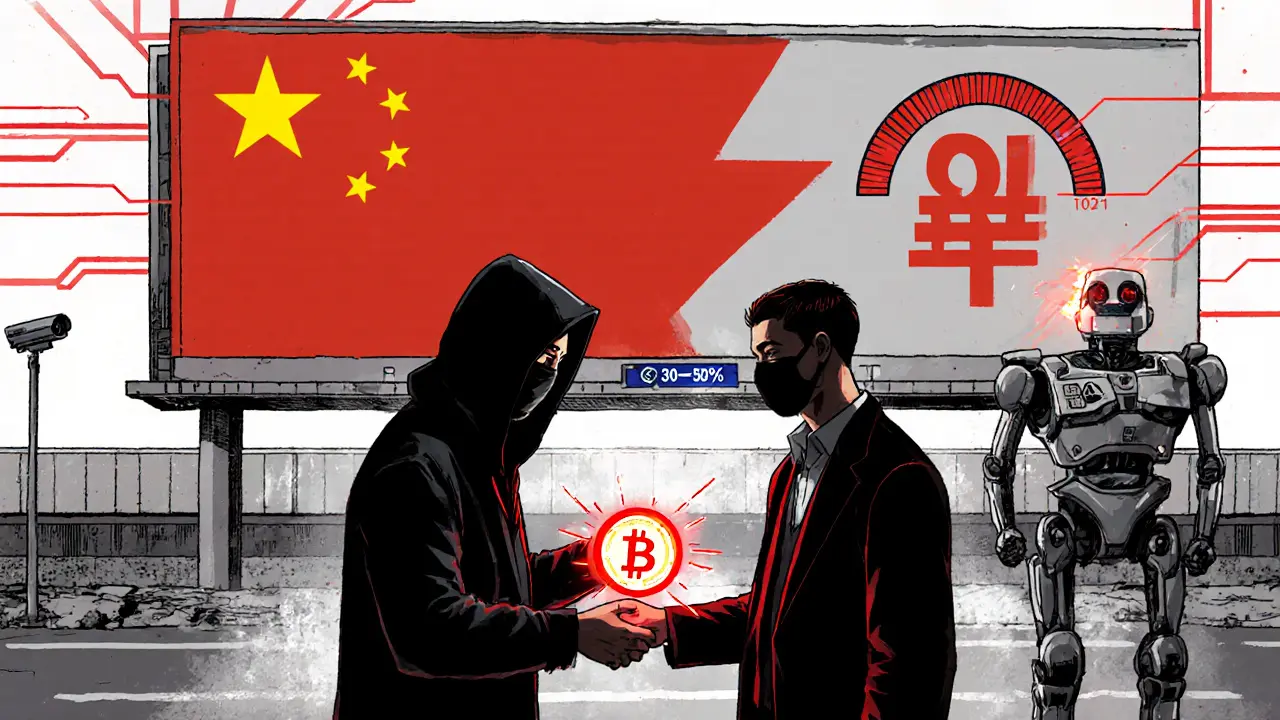
Estimating Premiums: Theoretical Models vs. Real‑World Data
Because underground markets operate in secrecy, researchers rely on proxy indicators and game‑theoretic models.
- Risk‑adjusted arbitrage model. Premium = (Base price) × (1 + Risk factor) × (1 + Liquidity factor). The risk factor is derived from enforcement severity scores (e.g., 0.30 for China, 0.15 for Nigeria).
- Transaction‑cost model. Premium = Base price + (Gas fees + Exchange fees + “gray‑market” commission). In high‑risk areas, gray‑market commissions can reach 5‑10% of trade value.
- Survey‑based estimation. Interviews with underground operators (often via anonymised forums) provide range estimates: 20‑50% for high‑risk jurisdictions, 5‑15% where enforcement is moderate.
All three approaches converge on a similar conclusion: the premium is roughly proportional to the perceived probability of legal repercussions plus the operational cost of moving funds covertly.
Regulatory Outlook and What It Means for Stakeholders
The Financial Action Task Force (FATF) reported that 99 jurisdictions have enacted crypto‑related legislation by mid‑2025. This wave of laws creates a patchwork where compliant markets coexist alongside hidden ones.
For investors, the takeaway is simple: assets purchased in a banned jurisdiction will almost always carry an invisible cost. Factoring a 20‑50% premium into ROI calculations is prudent.
Policymakers aiming to curb illicit activity should consider that stricter bans often push users deeper underground, inflating premiums and encouraging the use of privacy coins. A balanced approach - clear licensing, AML monitoring, and education - can reduce the incentive to turn to black‑market channels.
Quick Reference Table
| Jurisdiction | Enforcement Strength | Typical Premium Range | Key Drivers |
|---|---|---|---|
| China | Very High | 30‑50% | Criminal penalties, digital yuan push, tight surveillance |
| Afghanistan | High (religious + security) | 20‑40% | Sharia ban, limited enforcement tools, privacy‑coin demand |
| Egypt | High | 25‑45% | Arrests, banking monitoring, high‑risk penalties |
| Nigeria | Medium‑High | 10‑20% | AML enforcement, licensing pressure, cross‑border workarounds |
Next Steps for Different Readers
- Investors: Adjust your cost basis by the estimated premium range for the jurisdiction you’re accessing. Consider using regulated offshore exchanges to avoid the hidden markup.
- Compliance officers: Monitor for unusual price differentials on internal transaction logs, especially when dealing with counterparties from high‑risk countries.
- Policy makers: Use premium data as an indirect metric of enforcement effectiveness. If premiums soar, the ban may be driving activity underground rather than eliminating it.
- Researchers: Partner with anonymised P2P platforms to collect real‑time pricing data, helping to close the current data gap.
Frequently Asked Questions
What exactly is an underground crypto market premium?
It is the extra amount a buyer pays on illegal or gray‑market platforms compared with the price quoted on regulated exchanges. The gap reflects supply limits, risk of prosecution, and reduced liquidity.
Why are premiums higher in China than in Nigeria?
China enforces a total ban with severe criminal penalties and extensive digital‑surveillance tools, driving risk premiums up to 50%. Nigeria, while aggressive on AML, still permits licensed trading, so the risk and thus the premium stay lower, typically under 20%.
Do privacy coins always cost more in banned zones?
Generally yes. Their built‑in anonymity shields users from detection, so sellers charge a secrecy premium of 15‑30% on top of the base underground markup.
Can decentralized exchanges eliminate these premiums?
DEXs reduce reliance on centralized intermediaries, but users still need internet access that can be blocked or monitored. Transaction fees and the need for gas also add cost, so DEXs lower but rarely erase the premium.
How should regulators interpret rising premiums?
A steep premium signals that law‑enforcement pressure is pushing activity underground, which can increase illicit use. It suggests policymakers may need to reconsider blanket bans in favor of regulated frameworks.

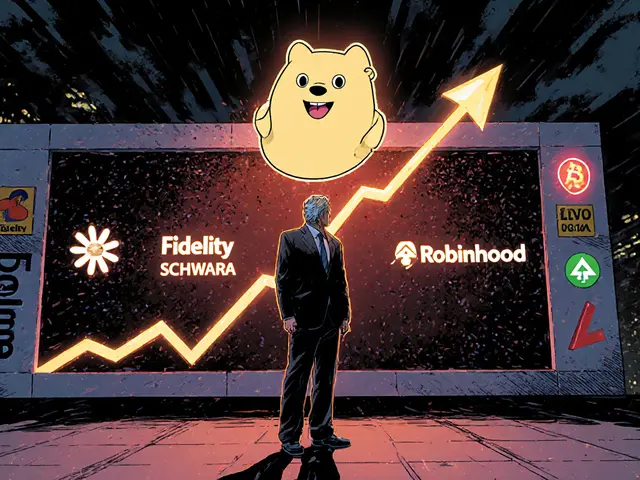
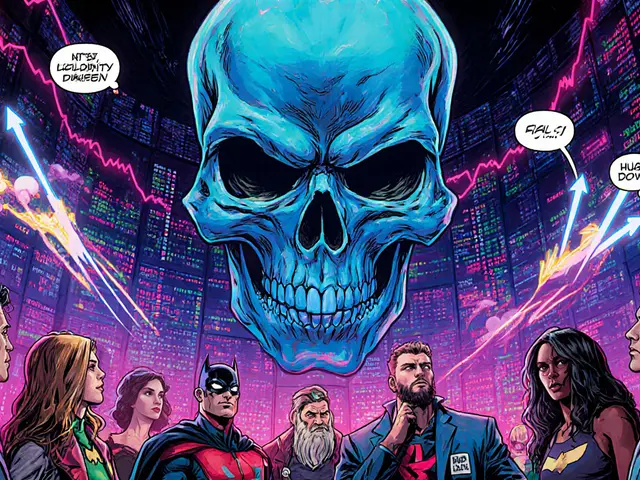
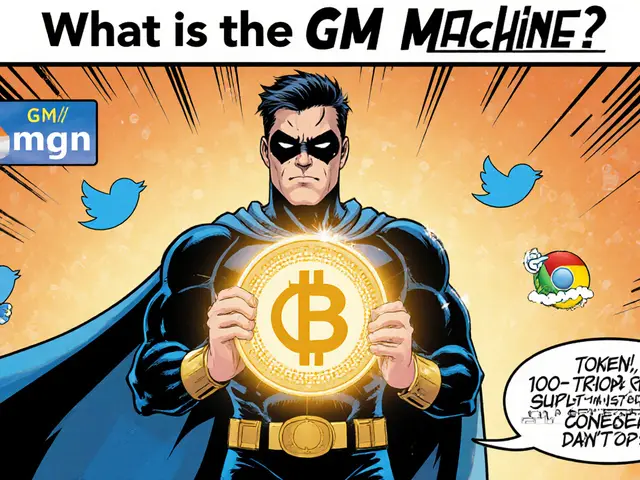
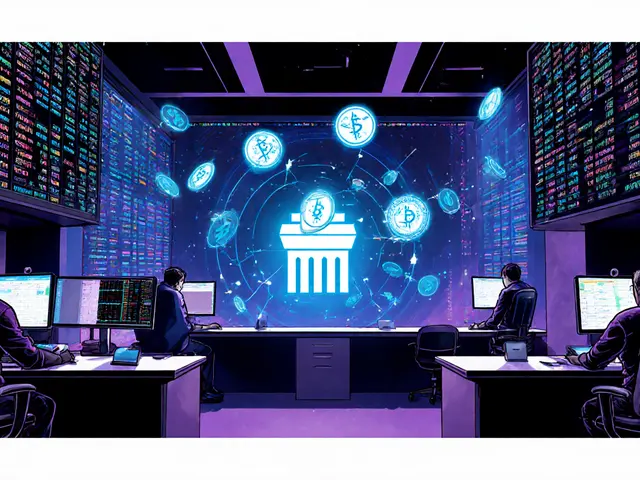
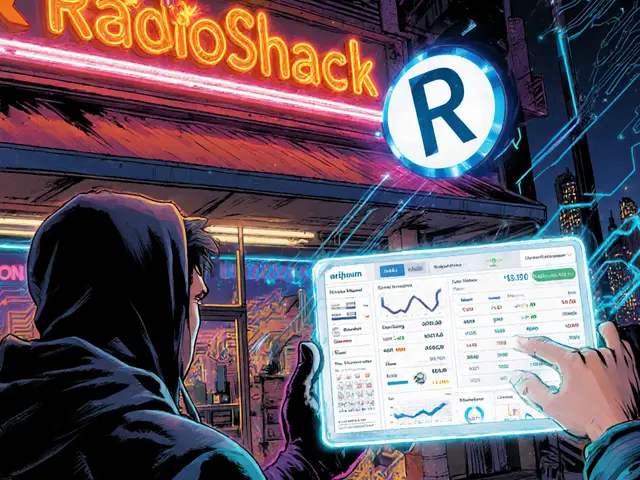
12 Comments
Natasha Nelson
October 4 2025Wait, so people are paying 50% more just to buy Bitcoin? That’s insane. I mean, really? 50%? That’s like buying a $20,000 car for $30,000… and then hoping the cops don’t show up. I don’t get how this isn’t a total disaster waiting to happen.
Abby Gonzales Hoffman
October 5 2025This is actually one of the most understated economic phenomena right now. The premium isn’t just about risk-it’s about trust collapse. When a government bans something its people already use, it doesn’t eliminate demand. It just turns the market into a high-stakes game of hide-and-seek with your life. And guess what? People are still playing. That’s not irrational. That’s human.
Look at China. They’ve spent billions on surveillance, yet underground trading persists because crypto isn’t just an asset-it’s a hedge against currency controls, inflation, and political instability. The 30–50% premium? That’s the cost of freedom. And it’s not just Bitcoin. Monero’s demand is exploding because it’s the only thing that can’t be traced back to your phone, your bank, or your neighbor’s snitching cousin.
And Nigeria? 10–20%? That’s a bargain. Their system still lets you trade legally-if you jump through enough hoops. But in Egypt? 45%? That’s not a market. That’s a tax on desperation. The arrests aren’t deterring people. They’re just making the price higher.
Decentralized exchanges don’t eliminate the premium-they just shift where the cost lives. Gas fees, liquidity slippage, phishing scams on Telegram groups… those are the new tolls. And privacy coins? They’re not luxury items. They’re survival tools. If your country can track your every transaction, anonymity isn’t a feature-it’s your only shield.
Policymakers keep thinking crackdowns = control. But every arrest, every wallet seizure, every ban just inflates the premium. It’s like trying to stop water with a sieve. The real solution isn’t more enforcement. It’s regulation that acknowledges people will always find a way to move value. Let them do it safely. License it. Tax it. Regulate it. Don’t drive it underground where it becomes a weapon against them.
This isn’t about crypto. It’s about trust in institutions. And right now? That trust is broken. And the premium? That’s the price of that broken trust.
Gabrielle Loeser
October 5 2025While the economic analysis is sound, it is imperative to consider the broader ethical implications of permitting such underground markets to persist. The normalization of illicit financial activity, even under the guise of financial autonomy, undermines the rule of law and exposes vulnerable populations to predatory actors. Regulatory frameworks must prioritize systemic integrity over perceived individual freedom.
Sarah Hannay
October 5 2025I appreciate the depth of this analysis, but I must respectfully challenge the assumption that higher premiums are an inevitable outcome of prohibition. The data presented does not account for the role of state-sponsored financial coercion-particularly in China, where the digital yuan is not merely an alternative but a tool of social control. The premium isn’t just a market reaction; it’s a resistance metric. People aren’t paying more because they want to-they’re paying more because they have no other choice. And that’s not capitalism. That’s coercion with a blockchain.
Furthermore, the article implies that legalization is the solution, but what if the real issue is not the lack of regulation, but the lack of legitimacy? When a government criminalizes access to a financial tool while simultaneously monopolizing its own digital currency, the market response is not irrational-it’s rational rebellion.
Let me be clear: I’m not advocating for lawlessness. But I am advocating for honesty. If you want to eliminate the premium, stop treating your citizens like criminals. Start treating crypto like a public utility-with access, not arrest.
Richard Williams
October 5 2025Big picture: this isn’t about crypto. It’s about people refusing to be locked out of the global economy. Whether you’re in Nigeria, Egypt, or Afghanistan-you still need to send money home, protect savings from inflation, or just not get ripped off by your own government’s bank. Crypto isn’t the problem. The ban is.
I’ve talked to traders in Lagos who use WhatsApp groups to match buyers and sellers. No exchange. No KYC. Just a phone, a QR code, and a prayer. They pay 15% extra. But they’d pay 100% if that’s what it took to get their money out.
Stop thinking of this as a crime problem. Think of it as a trust problem. And fix the trust.
ashish ramani
October 5 2025Interesting data but no mention of how many of these underground traders are actually laundering money for criminal syndicates. The premium might be a market signal, but the underlying activity is often tied to human trafficking, drug cartels, and terror financing. This isn’t freedom-it’s financial chaos with a crypto veneer.
Elizabeth Mitchell
October 6 2025So… people are paying more because they’re scared? That’s wild. I guess if your government says you can’t have Bitcoin, and you really want it, you just… pay extra? Like buying a concert ticket from a guy in an alley?
Prabhleen Bhatti
October 6 2025As someone from India-where crypto is in a gray zone-we’re seeing the same pattern but with a twist. DEXs like Uniswap and PancakeSwap are booming via VPNs, and P2P platforms like LocalBitcoins and Paxful are flooded with INR traders. The premium? 8–15% for BTC, but for Monero? 25–30%. Why? Because in India, even if you’re not breaking the law, your bank will freeze your account if you even mention crypto. So the premium isn’t just for risk-it’s for silence.
Also, let’s not ignore the role of the Indian diaspora. Many Nigerians, Egyptians, even Afghans are using Indian P2P traders as intermediaries because India has better liquidity and fewer arrests. So the premium isn’t just local-it’s globalized through informal networks. The real story? The underground market is now a decentralized diaspora economy.
And yes, we’re all using Telegram. No, we’re not giving you our wallet addresses. 😅
Cyndy Mcquiston
October 6 2025China’s ban is smart. Let them pay 50% to some criminal ring. Americans think crypto is freedom. It’s not. It’s a scam for the gullible. The state should crush this garbage. No exceptions.
Chris Houser
October 7 2025From Lagos: we’re not paying premiums-we’re paying survival taxes. My cousin got arrested last year for sending $500 to his sister in Ghana via crypto. He spent 3 months in jail. Now he uses cash couriers. But the kids? They use DEXs. They know the risks. They don’t care. Because inflation is 30%. The Naira is trash. Crypto isn’t a luxury. It’s lunch.
And yeah, we use Monero. Not because we’re hackers. Because the EFCC can track every bank transfer. But they can’t track a wallet that doesn’t leave a trail. That’s not crime. That’s common sense.
Stop calling us criminals. Call it what it is: economic self-defense.
William Burns
October 8 2025While the article presents a compelling narrative, it fundamentally misunderstands the nature of decentralized finance. The notion that ‘premiums’ reflect market efficiency is a fallacy rooted in libertarian idealism. The underground crypto economy is not a legitimate market-it is a parasitic ecosystem that exploits regulatory vacuums to facilitate capital flight, tax evasion, and the erosion of monetary sovereignty. The so-called ‘risk premium’ is merely the cost of criminal activity, and its normalization represents a catastrophic failure of governance.
Rampraveen Rani
October 9 2025Bro in Egypt paying 45% extra for BTC? That’s wild 😳 But honestly? If I had to choose between my freedom and my bank account… I’d go crypto every time. DEXs + Monero = life hack 🚀